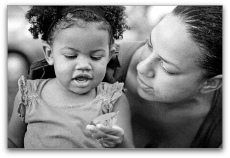
People describing the birth of their first child often sound overly sentimental, using words like miraculous, life-changing and astounding. For those not enmeshed in child rearing, new parents appear overly melodramatic. But those working in the field of Developmental Psychology relate to the excitement of bringing a new life into the world and watching it develop.
Developmental psychology professionals share new parents’ astonishment, yet their excitement doesn’t end with infancy or early childhood. Developmental psychology professionals are equally interested in what happens between a person’s conception and last breath; the whole of life excites and fascinates. They want to know how and why people change, or why some don’t change, over the course of time.
Stages of Development
The area breaks down the study of human development into the following stages and categories:
- Infancy
- Childhood
- Adolescence
- Early Adulthood, Middle Adulthood and Older Adults
- Developmental Disabilities
Additionally, groups are delineated into sub-categories, such as preschool-aged and school-aged children, early and late adolescence, and early, middle and late adulthood.
Karen Bartsch, a developmental psychologist and professor of psychology at the University of Wyoming in Laramie, Wyo., said that professionals often break down the field into age groups based on the research methods used to study the groups. For example, behavioral research methods are used to study infants (birth to age 2) because these children can’t talk or tell a researcher how they’re feeling or what they’re thinking. While the 3 to 7 age group can talk, they have a short attention span, and researchers have to adjust their speech so that children understand. Also, some researchers study a topic like memory across every age category, Bartsch said, from infancy to old age .
To understand the depth and scope of this field, consider how many changes a person actually undergoes in a lifetime. Imagine the photos on a memory board or in a scrapbook for a person’s 75th birthday party, for instance, and think about the variations in physical appearance for this person from infancy onward. Some of the pictures might not even look at all like the person celebrating his or her birthday.
Physical appearance changes, but photographs often give us a glimpse of other changes occurring simultaneously, such as emotional, cognitive, and social changes; developmental psychology professionals explore these changes as well.
Where do Developmental Psychology Professionals Work?
Developmentalists also study and research all the contextual influences that impact change, such as socioeconomic conditions, culture, and genetics. Family, parenting styles, divorce, friends, religion, poverty, physical and emotional abuse, and educational levels all play significant roles in influencing a person’s development and behavior.
Because developmental psychology is so broad and encompasses such a large number of aspects, most professionals choose to focus on one life stage, and particularly on one topic within that category, such as moral development in school-aged children, or the potential decline of motor skills in the elderly.
Bartsch credits the variety and broadness of the field as capturing her interests. “This field covers anything I could possibly be interested in with regard to human beings.”
In deciding to specialize in developmental psychology, she said the concept of how and why people change fascinated her, and now having worked in the field for nearly three decades , Bartsch said she still finds it fascinating. Her current research focuses on conceptual development in children ages 3 to 7, and she teaches developmental psychology classes at UW.
Numerous practical applications of the science of developmental psychology exist across several different careers, all aiming to help people realize their full potential. Teachers and counselors must have knowledge of developmental psychology theories and principles, as well as health-care workers, those who work with elderly, and social workers.
For those wanting to work with people directly as developmental psychology professionals, positions in hospitals, medical centers, educational institutions and preschools exist. These professionals can also find employment in assisted living centers for the elderly and as juvenile advocates for the court system, working for homeless programs, and educational toy companies.
If you are interested in how and why people change, and using theories about change to help people realize their full potential, you should consider a career in developmental psychology.
Most positions in developmental psychology require at least a master’s degree in psychology. Internships in hospitals and fieldwork in social service agencies give students an opportunity to gain valuable work experience before graduation. Many positions require a PhD, especially teaching and research positions at universities. Teaching assistantships are available at some universities for those pursuing a PhD in psychology.
Also, learn more about the psychology career licensing processes and what the requirements for licensure are: Psychology Career Licensure.